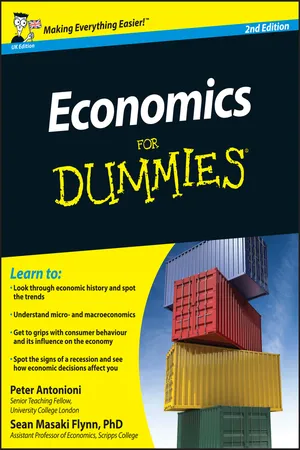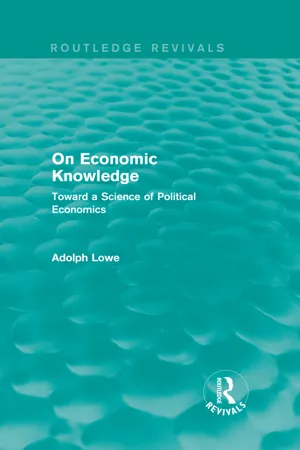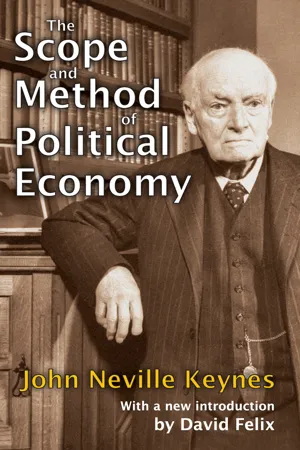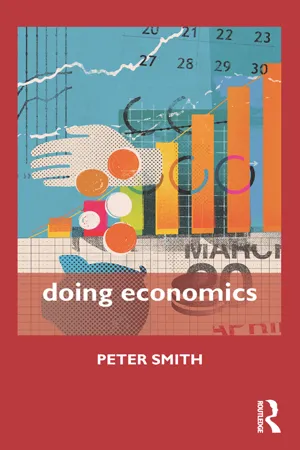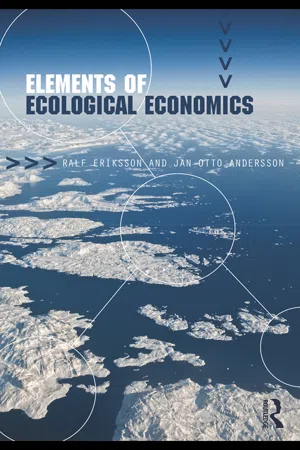Economics
Economics as Social Science
Economics as a social science studies how individuals, businesses, and governments allocate resources to satisfy their needs and wants. It examines the production, distribution, and consumption of goods and services within society. By analyzing human behavior and interactions, economics seeks to understand and address issues such as scarcity, inequality, and efficiency in resource allocation.
Written by Perlego with AI-assistance
Related key terms
6 Key excerpts on "Economics as Social Science"
- eBook - ePub
- Cynthia Metcalf, Rhonda Atkinson(Authors)
- 2017(Publication Date)
- Research & Education Association(Publisher)
Most contemporary definitions of economics involve the notions of choice and scarcity and their relationship to one another. Perhaps the earliest of these is by Lionel Robbins in 1935: “Economics is a science which studies human behavior as a relationship between ends and scarce means which have alternative uses.” Virtually all textbooks have definitions that are derived from this definition, though the exact wording differs from author to author.The standard definition of economics is something like this: “Economics is the social science that examines how people choose to use limited or scarce resources to obtain maximum satisfaction of unlimited wants.”Macroeconomics is the study of the economy as a whole and includes topics such as inflation, unemployment, and economic growth. Microeconomics is the study of the individual parts (e.g., households, business firms, and government agencies) that make up the economy. It particularly emphasizes both how these units make decisions and the consequences of these decisions.COMPETENCY 2.1Analyze how scarcity and opportunity cost influence choices about how to allocate resources.Economists believe that human wants are unlimited while the resources to satisfy those needs are limited. Consequently, society is never able to produce enough goods and services to satisfy everybody, or almost anyone, completely. Alternatively, resources are scarce relative to human needs and desires. When resources are limited, the limitation affects prices (the amount of money needed to buy goods, services, or resources). Scarcity - eBook - ePub
- Peter Antonioni, Sean Masaki Flynn(Authors)
- 2010(Publication Date)
- For Dummies(Publisher)
Part I Economics: The Science of How People Deal with ScarcityIn this part . . .Economics studies how people deal with scarcity and the inescapable fact that our wants typically exceed the means available to satisfy them. The fact that life has limits may not at first seem like a good basis for an entire social science, but every government decision, every business decision and a large chunk of your personal decisions all come down to deciding how to get the most out of limited resources. Consequently, as we explain in this part, economics is fundamental to almost all aspects of life.Passage contains an image
Chapter 1 What Does Economics Study? And Why Should You Care? In This Chapter Taking a quick peek at economic history Observing how people cope with scarcity Separating macroeconomics and microeconomics Growing the economy and avoiding recessions Understanding individual and firm behaviour Getting a grip on the graphs and models that economists love to useEconomics is the science that studies how people and societies make decisions that allow them to get the most out of their limited resources. Because every country, every business and every person deals with constraints and limitations, economics is literally everywhere.For example, you could be doing something else right now instead of reading this book: exercising, watching a film or talking with a friend. The only reason for you to be reading this book is that doing so is the best possible use of your very limited time.In the same way, you hope that the paper and ink used to make this book have been put to their very best use. Similarly, we all hope that every last tax pound that the government spends is being used in the best possible way, and not being dissipated on projects of secondary importance. - eBook - ePub
On Economic Knowledge
Toward a Science of Political Economics
- Adolph Lowe(Author)
- 2017(Publication Date)
- Routledge(Publisher)
In what concepts can we describe the conditions under which economic events occur, and how are we to proceed in order to ascertain repeatable patterns of interdependence that would permit us to speak of an economic science? Our earlier distinction between technological and social patterns of economic behavior suggests two different though complementary answers. There is a technological core in all economic activity, be it performed in isolation or in social interaction. To that extent Economics is simply a part of Material Technology. If we wish intellectually to grasp and practically to handle the relevant processes we are referred to rules of engineering and to laws of nature as the ultimate sources from which explanations and predictions can be derived. A body of more or less exact knowledge will thus be obtained, but it hardly deserves a special label as a science of Economics. It is different with the social patterns of provisioning and the states and processes of the human aggregates to which they give rise. These patterns too are ultimately in the service of the complex technological processes which the division of labor creates. But their immediate function is the achievement of provision with material means through the manipulation of men rather than of matter. They fulfill this function to the extent to which each member of an economic society succeeds in making the other members behave as if they were matter-like means for his socially approved ends, while each one recognizes the human, namely, spontaneous quality of the other’s actions. The formal problem of Economics is thus a variant of the time-honored part-aggregate issue. But it presents itself in a peculiar means-ends configuration in which it occurs neither in the natural sciences nor in any other of the social sciences - eBook - ePub
- John Neville Keynes(Author)
- 2017(Publication Date)
- Routledge(Publisher)
personal wealth all those capacities that enable men to be efficient producers of exchangeable wealth. For although so-called personal wealth does not, under the former alternative, directly constitute part of the subject-matter of the science, it still comes in for discussion as a source of weal th, and as such has still to be recognised as an economic factor of vital consequence.Wealth being defined as above, economic activity may be correspondingly defined as human activity which directs itself towards the production and appropriation of such means of satisfying human needs as are capable of being made the subject of exchange. The economic life of a community is constituted by the economic activities of the members of which it is composed, acting either in their individual or in their corporate capacity. The term economy is sometimes used as equivalent to economic life, and by national economy is meant accordingly the economic life of a nation. It is to be observed that as civilisation advances, each individual becomes more and more dependent on others for the satisfaction of his needs; and hence economic life increases in complexity. In other words, with the progress of society, the organization of industry and the distribution of industrial functions grow increasingly complicated, and the phenomena resulting from men's economic activities become more and more varied in character.§ 5. Definition of Political Economy. —Political economy, regarded as a positive science, is often briefly defined as the science of the phenomena of wealth; and this definition has the merit of directness and simplicity. There seems, however, some advantage in attempting so to define the study as explicitly to indicate that it is not primarily concerned either with purely physical phenomena or with psychological or political phenomena as such, but with phenomena that originate in the activity of human beings in their social relations one with another. - eBook - ePub
- Peter Smith(Author)
- 2016(Publication Date)
- Routledge(Publisher)
social sciences .Economics and the scientific method
An argument that is put forward to justify economics being classified as a science is that it uses ‘scientific method’. In other words, could we claim that economics displays the sort of rigour expected in science, at least in terms of the methods that it employs?There are many ways of describing ‘the scientific method’, but a typical sequence is set out in Figure 6.1 .The approach begins with observation – a researcher observes something that seems worthy of investigation. This would lead to a research question that captures a key item of interest arising from the observation. From the question, a testable hypothesis is devised that provides a possible explanation of or answer to the question. The next phase is to design and carry out an experiment that will provide evidence for testing the hypothesis. Analysing the results of the experiment then allows one of three possible conclusions to be drawn.Figure 6.1The scientific method.One possibility is that the evidence from the experiment supports the hypothesis, in which case the experiment should be repeated or refined in order to allow evidence to accumulate in favour of the hypothesis. If the evi-dence only partially supports the hypothesis, or if the evidence turns out to be inconsistent with the hypothesis, then the hypothesis needs to be revised or refined. At this stage it may be that an entirely new hypothesis needs to be developed, and a new experiment carried out.How well does economics measure up to this method? The general approach would be widely accepted. Economists observe aspects of the economy and economic decisions being made. They formulate a research question, and from that would identify an appropriate hypothesis to be tested. They would then set out to test that hypothesis, drawing on mathematical or statistical methods. Based on the results they would then evaluate the strength of the evidence to see whether it supported or rejected the hypothesis. - eBook - ePub
- Jan Otto Andersson, Ralf Eriksson(Authors)
- 2010(Publication Date)
- Routledge(Publisher)
The insights from ecology and economics have to be applied within a social/ political environment (so to speak) – and more and more often also without the political system. Generally speaking, the social dimension deals with the points which economics, strictly speaking, does not usually deal with, that is economic policy – again, in a wide sense. With this we mean economic policy, not as calculating the optimal level of interest or some other economic variable, but economic policy when aspects of distribution and justice are also under consideration. That is, in questions for example concerning global environmental policy, there is often a lack of political infrastructure, or governance, that have to be formed if real results are going to be achieved. Unequal income distribution, different political cultures, developmental stage, history and other aspects have a role to play in the formation of these structures.Some of these features are depicted in Figure 5.4 18 (in a somewhat simplified manner). This figure is in principle similar to Figure 5.3 except that here we have implanted the economic system into “social institutions.” This represents property rights, economic power and income distribution but also stands for other types of institutions including norms, laws and so on. Other forms of capital are discussed in Chapter 2 .Figure 5.4 The economy embedded in social institutions and in the ecosystemDifferent ways of thinking about sustainability 19
It should be evident by now that if there is one concept that unites ecological economics, it is sustainability. With this we mean that ecological economists are very serious about making sustainability a cornerstone of long-run economic policy. However, the problem seems to be that sustainability also unites everyone else. Perman et al.
Learn about this page
Index pages curate the most relevant extracts from our library of academic textbooks. They’ve been created using an in-house natural language model (NLM), each adding context and meaning to key research topics.

